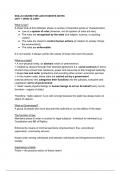Summary
Summary SCL1501: SKILLS COURSE FOR LAW STUDENTS EXAMINATION NOTES
- Institution
- University Of South Africa (Unisa)
By means of its concise, accurate, straight forward nature, these notes ensure your success to passing this module from a place of confident understanding; all coming from a fellow student who achieved a high distinction in this exam.
[Show more]



